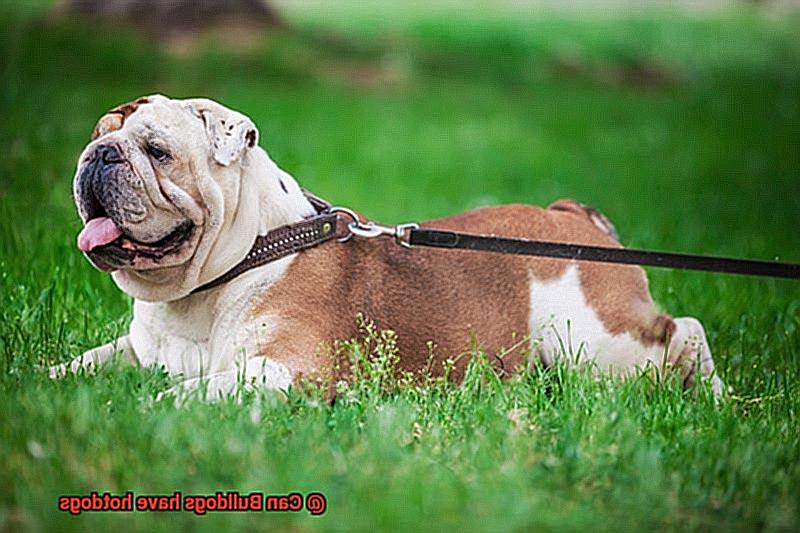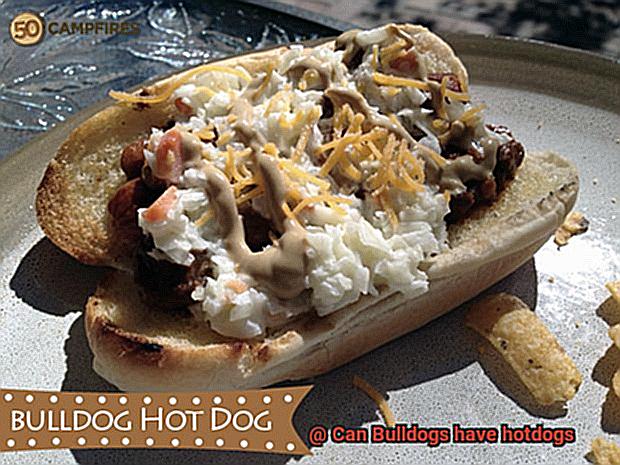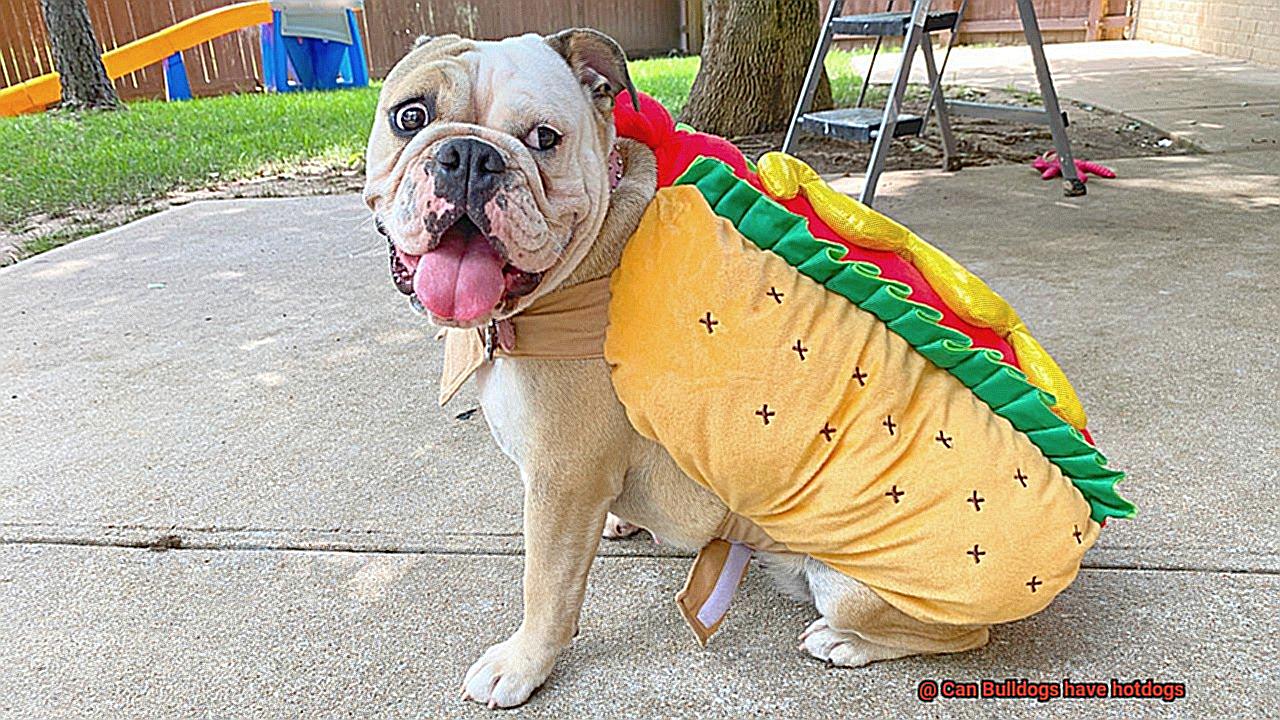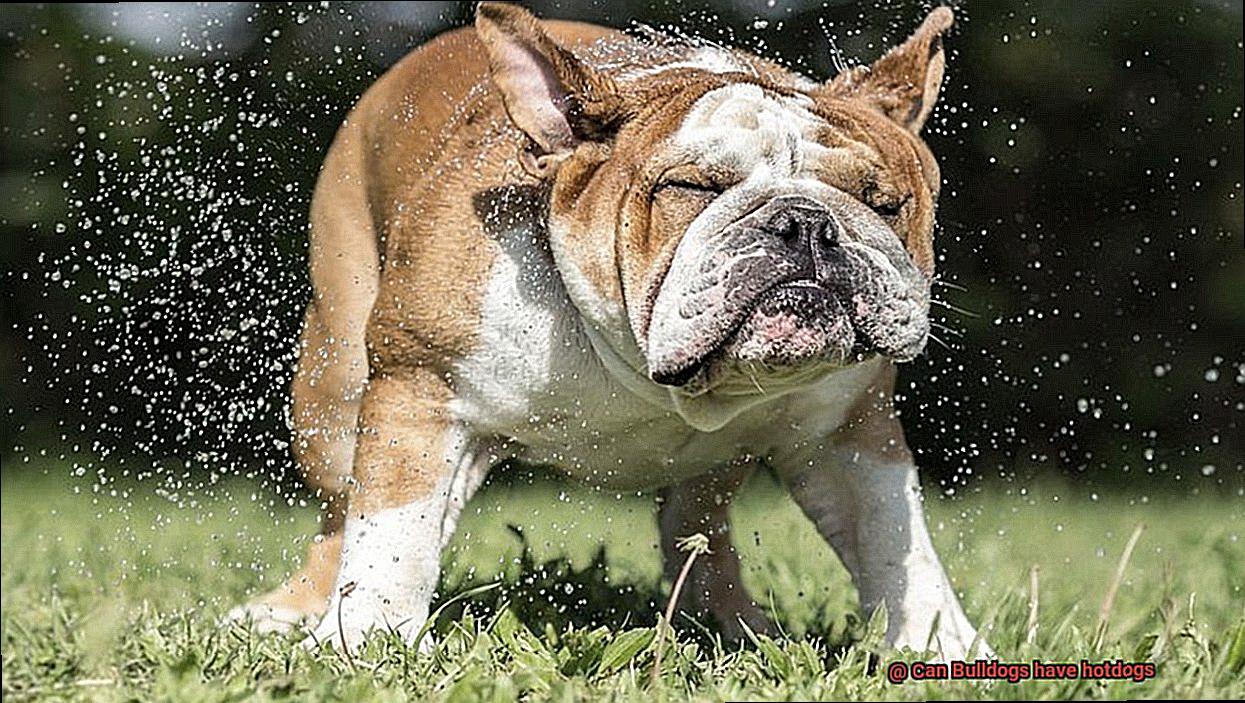Can Bulldogs have hotdogs?
Imagine this: the sizzle of a backyard barbecue, the mouthwatering aroma of charred meat wafting through the air, and your adorable Bulldog gazing at you with those irresistible puppy eyes, begging for a taste of your juicy hotdog. But before you give in to their adorable plea, it’s time to address the burning question – can Bulldogs have hotdogs?
In this blog post, we’re diving headfirst into the world of canine cuisine to uncover whether hotdogs – a beloved human treat – are safe for our furry friends. It may seem like a harmless gesture, but it’s crucial to consider both the potential risks and benefits when introducing unfamiliar foods into our Bulldog’s diet.
So grab a seat and get ready as we unravel the truth, debunk myths, and arm you with all the essential information you need to make an educated decision about sharing this classic American delicacy with your Bulldog. But beware: the answer might not be as straightforward as you think.
Understanding the Anatomy of Bulldogs
Contents
- 1 Understanding the Anatomy of Bulldogs
- 2 The Potential Health Risks of Hotdogs for Bulldogs
- 3 How to Feed Hotdogs to Your Bulldog Safely
- 4 Looking Out for Signs of Illness After Eating Hotdogs
- 5 Nutritional Benefits of Hotdogs for Bulldogs
- 6 Tips on Choosing the Right Brand of Hotdog for Your Dog
- 7 Alternatives to Hotdogs for Bulldogs
- 8 Conclusion
Bulldogs are beloved companions known for their unique physical features, including their adorable flat faces and compact bodies. However, these distinctive characteristics can impact their ability to consume certain foods, like hotdogs. In this article, we will explore the anatomy of bulldogs and how it relates to their ability to enjoy hotdogs safely.
Brachycephalic Structure:
Bulldogs have a brachycephalic (short-nosed) structure, which means their airways are compacted, and they have a flattened face. This can make it challenging for them to breathe and eat certain types of food. Hotdogs, with their cylindrical shape and chewy texture, can pose a risk of choking or respiratory distress for bulldogs.
Health Issues:
Bulldogs are prone to various health conditions such as obesity, allergies, and gastrointestinal problems. Feeding them foods high in fat, salt, and preservatives like hotdogs can worsen these issues. The sodium content in hotdogs can lead to dehydration and electrolyte imbalances, which can be particularly problematic for bulldogs who struggle with temperature regulation.
Mouth and Jaw Structure:
Bulldogs have a narrow mouth and smaller teeth compared to other breeds. This can make it difficult for them to chew harder foods like hotdogs properly. Inadequate chewing increases the risk of choking hazards or gastrointestinal blockages.
Sensitive Digestive System:
Bulldogs often have sensitive stomachs and digestive systems. Hotdogs contain spices, additives, and artificial flavors that can trigger digestive issues such as diarrhea, vomiting, or food allergies in bulldogs.
While it may be tempting to share a hotdog with your furry friend, it’s best to avoid feeding them this processed meat altogether.
Bulldogs’ brachycephalic structure, propensity for health issues, smaller mouth and jaw structure, and sensitive digestive systems make hotdogs a less-than-ideal food choice for them.
Always prioritize your bulldog’s overall health and well-being by consulting with a veterinarian to ensure they are receiving a balanced and appropriate diet.
Remember, there are plenty of other dog-friendly treats and foods available that are safe and healthy for your bulldog to enjoy. Your veterinarian can guide you in selecting the best options based on your bulldog’s specific needs and dietary requirements.
The Potential Health Risks of Hotdogs for Bulldogs
French Bulldogs are known for their charming personalities and distinctive physical features. However, their unique anatomy and sensitive health issues require careful consideration when it comes to their diet. In this article, we will explore the potential health risks of feeding hotdogs to Bulldogs and provide valuable insights for French Bulldog owners.
Bulldogs and Their Susceptibility to Health Issues:
French Bulldogs, with their short snouts and compact bodies, are more prone to certain health conditions. These include respiratory problems, obesity, and gastrointestinal issues. Understanding these vulnerabilities is crucial in making informed choices about their diet.
The Nutritional Composition of Hotdogs:
Hotdogs are processed meat products that often contain high levels of fat, sodium, and preservatives. They are typically made from a mixture of different meats, additives, and fillers. These ingredients can contribute to weight gain, heart disease, diabetes, and digestive upset in Bulldogs.
Gastrointestinal Concerns:
Bulldogs are known for their sensitive stomachs, and consuming hotdogs can exacerbate gastrointestinal issues. The additives and preservatives found in hotdogs can lead to symptoms such as diarrhea, vomiting, and gas. It’s essential to prioritize your Bulldog’s digestive health by opting for healthier alternatives.
Choking Hazards:
Bulldogs have a tendency to gulp down their food due to their shortened airways and flat faces. Hotdogs, with their cylindrical shape and smooth texture, pose a choking hazard if not adequately chewed. This risk highlights the importance of choosing safe treats that are easier for Bulldogs to consume.
Harmful Ingredients in Hotdogs:
Hotdogs often contain seasonings and spices that can be harmful to dogs, such as onion powder and garlic powder. While small amounts may not cause immediate harm, regular consumption of hotdogs can lead to cumulative toxicity over time. Opting for natural and wholesome treats is a better choice for your Bulldog’s overall well-being.
As French Bulldog owners, we want to prioritize the health and happiness of our beloved companions. While it may be tempting to share a hotdog with your Bulldog, the potential health risks associated with this processed meat product outweigh any benefits.
Instead, focus on providing a balanced and nutritious diet specifically tailored to meet your Bulldog’s needs. Consult with a veterinarian for safe and healthy alternatives that will keep your Bulldog thriving in the long run.
Remember, a happy and healthy Bulldog is a cherished companion for life.
How to Feed Hotdogs to Your Bulldog Safely
We all love treating our furry friends to something special now and then, but when it comes to hotdogs, it’s important to proceed with caution. In this article, we’ll share valuable insights on how to safely feed hotdogs to your beloved French Bulldog.
Understanding Bulldogs’ Dietary Needs:
French Bulldogs have unique dietary requirements due to their brachycephalic skull shape and potential for allergies. It’s crucial to prioritize their overall diet and nutrition while considering occasional treats like hotdogs.
The Sodium Issue:
Hotdogs are notorious for their high sodium content, which can lead to dehydration and electrolyte imbalances in Bulldogs. Since Frenchies already struggle with regulating body temperature, it’s vital to monitor their sodium intake carefully.
Preservatives and Additives:
Hotdogs often contain preservatives and additives that can cause digestive issues in Bulldogs, such as upset stomach or diarrhea. Opting for high-quality hotdogs without fillers or artificial ingredients is the best way to minimize potential problems.
Choking Hazards:
Bulldogs are prone to respiratory issues due to their short snouts and narrow airways. To reduce the risk of choking or blockage, cut hotdogs into small, bite-sized pieces before offering them as a treat. Always supervise your Frenchie while they enjoy their snack.
Moderation is Key:
Portion control is crucial for Bulldogs, especially those prone to weight gain. Treats like hotdogs should be given in moderation, with portion sizes based on your Frenchie’s age, weight, and overall health condition. Consult with your veterinarian for tailored recommendations.
Allergic Reactions:
Every dog is unique, and some Bulldogs may have sensitivities or allergies to certain ingredients in hotdogs. If you notice any signs of discomfort, such as vomiting, diarrhea, or itching after feeding hotdogs, consult your vet immediately.
Looking Out for Signs of Illness After Eating Hotdogs

When it comes to feeding hotdogs to our Bulldogs, it’s important to be aware of the potential risks and watch out for any signs of illness afterward. In this article, we’ll explore the potential health risks of feeding hotdogs to Bulldogs and provide tips on how to monitor your pup for signs of illness.
The Risks of Feeding Hotdogs to Bulldogs:
- Bulldogs have sensitive stomachs, making them prone to digestive upset. Hotdogs, being high in fat and sodium, can cause gastrointestinal issues such as vomiting, diarrhea, excessive gas, and bloating.
- Bulldogs are at a higher risk of developing pancreatitis, an inflammation of the pancreas, due to their sensitivity to high-fat diets. Hotdogs, being fatty processed meats, can increase the risk of pancreatitis in Bulldogs.
- Some hotdogs may contain toxic ingredients like onions or garlic, which can cause gastrointestinal irritation and even lead to more serious conditions such as anemia.
Monitoring for Signs of Illness:
- Keep an eye on your Bulldog’s behavior, appetite, and bathroom habits after feeding them hotdogs.
- Look out for symptoms such as vomiting, diarrhea, excessive thirst or urination, lethargy, abdominal pain or bloating, loss of appetite, or changes in coat appearance.
- If you notice any concerning symptoms, consult your veterinarian for further evaluation and guidance.
Nutritional Benefits of Hotdogs for Bulldogs
Are you tempted to treat your furry friend to a juicy hotdog? Before you make that decision, let’s dive into the nutritional benefits (and potential drawbacks) of these sizzling sausages. As an expert in bulldog nutrition, I’ve done the research and consulted with veterinarians to provide you with all the information you need to make an informed decision.
Protein Power:
Bulldogs, known for their muscular build, require a protein-rich diet to maintain their strong physique. Hotdogs can indeed provide a good amount of protein. Look for high-quality hotdogs made from real meat, without excessive additives or preservatives. Protein is essential for tissue growth and repair, so it’s a beneficial component of your bulldog’s diet.
Vitamins and Minerals:
Hotdogs can also offer some vitamins and minerals that are important for your bulldog’s overall health. Vitamin B12, iron, and zinc are often found in hotdogs. These nutrients play vital roles in energy production, immune function, and maintaining healthy skin and coat. However, keep in mind that the levels of these nutrients may vary depending on the brand and quality of the hotdog.
Portion Control is Key:
While hotdogs may have their nutritional perks, it’s crucial to exercise portion control. Hotdogs can be high in fat and sodium, which can be harmful to dogs if consumed excessively. Bulldogs are prone to obesity and heart problems, so limiting their intake of high-fat and high-sodium foods like hotdogs is essential for their well-being.
Consider Allergies and Sensitivities:
Bulldogs have sensitive digestive systems, making them more prone to food allergies or sensitivities. Some ingredients commonly found in hotdogs, such as spices or artificial additives, can trigger gastrointestinal issues or allergic reactions in certain dogs. It’s always best to consult with your veterinarian if your bulldog has any known allergies or sensitivities before introducing hotdogs into their diet.
Hotdogs can provide bulldogs with protein, vitamins, and minerals, but it’s important to choose high-quality options and practice portion control due to their high fat and sodium content.
Additionally, consider any known allergies or sensitivities your bulldog may have before offering them hotdogs. Your veterinarian can provide personalized advice and ensure that your furry friend’s nutritional needs are met without compromising their health.
Tips on Choosing the Right Brand of Hotdog for Your Dog
When it comes to treating our furry friends, it’s important to choose the right snacks that not only taste good but are also safe and healthy. If you have a lovable French Bulldog, you might be wondering if hotdogs are a suitable treat. In this article, we will explore the important factors to consider when choosing the right brand of hotdog for your Bulldog, ensuring their health and happiness.
Prioritize Health and Nutrition:
When browsing the hotdog aisle, keep an eye out for brands that use high-quality ingredients and avoid fillers, artificial preservatives, and additives. Opt for hotdogs made from real meat, such as beef or chicken, rather than processed meats or by-products. Bulldogs can have sensitive stomachs, so choosing a brand that prioritizes nutrition is essential.
Consider Specific Needs:
French Bulldogs are prone to allergies and digestive problems, so it’s crucial to consider any dietary restrictions or sensitivities your Bulldog may have. Consult with your veterinarian before introducing hotdogs into their diet to ensure they are safe for your pup’s unique needs.
Read Labels Carefully:
To keep your Bulldog safe and healthy, read the labels of hotdog brands carefully. Avoid hotdogs that contain onions, garlic, or spices, as these can be toxic to dogs. Excessive salt content should also be avoided since Bulldogs can be prone to dehydration and other health issues due to high sodium levels.

Quality Control and Transparency:
Choose hotdog brands that undergo quality control testing and meet industry standards for pet food safety. Look for brands that are transparent about their sourcing and production processes. Reading reviews and feedback from other dog owners who have tried the brand you’re considering can also provide valuable insights.
Size and Texture Matters:

Consider the size and texture of the hotdogs when selecting a brand for your Bulldog. Bulldogs have a unique jaw structure that can make it difficult for them to chew certain types of food. Opt for soft and easy-to-chew hotdogs or consider cutting them into smaller pieces to make them easier to consume.
Moderation is Key:
While hotdogs can be a tasty treat, they should be given in moderation and not replace balanced meals specially formulated for dogs. Treat hotdogs as an occasional indulgence rather than a regular part of your Bulldog’s diet to maintain their overall health and well-being.
Alternatives to Hotdogs for Bulldogs
Are you tired of relying on hotdogs as your go-to treat for your furry friend? Well, you’re in luck because I’ve got some mouth-watering alternatives that will have your Bulldog drooling for more. Let’s dig in.

- Lean Meats: Chicken and turkey can be a fantastic alternative to hotdogs. They’re lower in fat and can still satisfy your pup’s taste buds. Just cook them up without any fancy seasonings, and voila. You’ve got a tasty treat that will have your Bulldog begging for seconds.
- Fruity Delights: Who says dogs can’t enjoy fruits? Bulldogs can nibble on apples, bananas, and berries like nobody’s business. Not only are they delicious, but these fruits also pack a punch of essential vitamins and minerals that will keep your Bulldog feeling top-notch.
- Veggies Galore: Don’t forget about the power of veggies. Carrots, green beans, and sweet potatoes are not only crunchy and delightful but can also aid in digestion. Your Bulldog will thank you for these wholesome snacks.
- Store-Bought Goodies: If you’re short on time or prefer the convenience of store-bought treats, fear not. There are plenty of options out there specifically designed for Bulldogs or similar breeds with specific dietary needs. Look for treats that are low in fat and sodium, free from artificial additives or preservatives – your Bulldog deserves the best.
Now, let me give you a friendly reminder – moderation is key. Treats should only make up a small portion of your Bulldog’s overall diet. The bulk of their meals should consist of balanced and nutritious food to keep them healthy and happy.
Before you run off to try these tasty alternatives, remember to consult with your veterinarian first. They can provide valuable guidance on what foods are suitable for your Bulldog’s specific needs.
8PqRcUkYkQk” >
Conclusion
In conclusion, Bulldogs should steer clear of hotdogs altogether. Their unique anatomy, with their brachycephalic structure and delicate digestive systems, simply doesn’t mix well with processed meats like hotdogs. These sodium and fat-loaded treats can worsen existing health issues such as obesity, allergies, and gastrointestinal problems that Bulldogs are prone to.
Furthermore, Bulldogs’ narrow mouths and smaller teeth struggle to properly chew tougher foods like hotdogs. This increases the risk of choking or dangerous blockages in their digestive tract. Hotdogs often contain spices, additives, and artificial flavors that can trigger stomach upset or food allergies in Bulldogs with sensitive tummies.
Instead of tempting fate with hotdogs, prioritize your Bulldog’s overall well-being by seeking guidance from a trusted veterinarian. They can help you design a balanced and appropriate diet tailored specifically to your Bulldog’s needs. There are countless dog-friendly treats and foods available that are both safe and healthy for your furry friend to enjoy.




